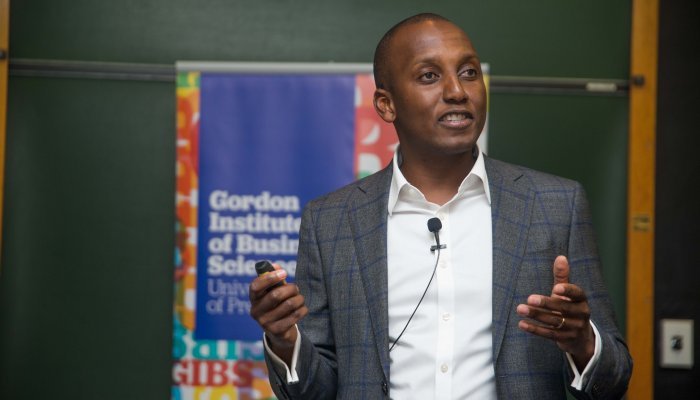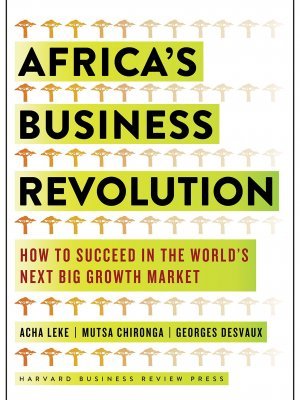Looking to correct this view, McKinsey’s Africa Senior Partner, Acha Leke, together with Nedbank Managing Executive for Consumer Banking, Mutsa Chironga, and McKinsey Africa’s Managing Partner, Georges Desvaux, have contributed a new book to the debate: Africa’s Business Revolution: How to Succeed in the World’s Next Big Growth Market.
Leke and Chironga addressed a recent GIBS forum to showcase the book. Leke said the book aims to ‘reset the mental map of Africa’ and give a better understanding of the continent’s business environment. Chironga added: “We were approached by Harvard Business Review to write this book about the businesses that are growing, investing and creating jobs across our continent, and what they do to be successful.”
In addition to sharing proprietary McKinsey research, the authors said the book is “bursting with company case studies and exclusive interviews with some of Africa’s most prominent executives”, including General Electric Africa, South African Breweries, Nigeria’s digital payment group Paga, Tanzanian logistics company MeTL Group, MTN, Moroccan risk firm Saham, and Coca-Cola. “This book comes to life with the vibrant stories of those who have navigated the many twists and turns on the road to building successful businesses on the continent,” noted the authors. Among the notable interviewees are humanitarian Graça Machel and Nigerian billionaire Aliko Dangote.
Snapshot of Africa
Many of Africa’s dividends have been well recorded in recent years as interest in the continent has increased, from its 54 distinct markets with a total population of more than 1.2 billion people; and its diversity highlighted by the fact that over 2 000 languages are spoken in Africa.
While six of the world’s fastest-growing economies can be found on the continent and five of the top 10 improvers in the World Bank’s Ease of Doing Business Index are African (Djibouti, Togo, Kenya, Côte d’Ivoire and Rwanda), Leke and Chironga did not address the recent Africa’s Business Revolution forum at GIBS with the intention of painting a utopian view of Africa. They acknowledged that Africa was a continent with many challenges, but said if businesses approached Africa with the right mindset it had the potential to deliver very favourable opportunities for growth and expansion. They wanted to stress, that now, more than ever, the continent and its leadership were ready to do business.
How to win in Africa
But succeeding in Africa is more than merely understanding the trends that offer opportunity. “How do you leverage these trends to build a profitable business in Africa?” asked Leke, adding: “The purpose of the book is to answer this question.”
1. Have a clear strategy
The best starting point is for companies to map their African strategy and have clear aspirations. “Are you focusing on one country, or do you want to be in practically every country in Africa or something in between?” asked Chironga. Once they are clear on their intentions, then businesses need to prioritise these markets and tailor their offering to suit the specific customer base. The book urges companies to bet on future growth markets, not only on the current success stories.
2. Innovate
Innovation in Africa comes in many forms, such as producing products and services to satisfy unmet needs while driving down cost and price points to enable the consumption of products. Companies also need to be innovative in how they engage with Africans; a one-size-fits-all approach does not work in a vastly diverse continent where language and cultural nuances matter. Certainly, in order to remain relevant in the long term, companies need to continually innovate.
Citing an example of innovation that worked in Africa, Leke explained that 30 years ago, a Singaporean company wanted to expand into Nigeria with their noodles – not a typically Nigerian food. But in just three decades, the company has become the most successful consumer goods firm in the country. To get to this point the company innovated across a number of dimensions, including distribution, manufacturing and marketing.
3. Take a long-term view
Leke and Chironga urged businesses to take a long-term view when investing in Africa. Companies that have thrived in Africa are the ones that have hunkered down and weathered the storms. The book gave four tips on how to do this:
· Be in it for the long term and ride out short-term volatility;
· Diversify to build a balanced portfolio;
· Integrate up and down your value chain; and,
· Understand local context and engage with governments.
The book drew on the success of Africa’s richest man, Dangote, who followed these steps exactly, and has succeeded in becoming Africa’s most successful businessman. This is an important lesson for anyone doing business in Africa, stressed Chironga.
4. Upskill your labour force
With more than 60% of Africa’s population under the age of 25, there is a huge need to find employment for the boom of young Africans. Fortunately, if businesses look, there is a wealth of talent to be found. This is not to say there isn’t a skills shortage in Africa. There is, Leke said, adding that “there needs to be a lot of focus on vocational training; this is important to bring in those skills and place people in jobs.”
In order to maximise the African labour force, Leke also called for companies to develop skills from within the organisation – specifically investing time and money in in-house training, which allows employees to grow and fill more senior positions.
And, finally, the inclusion of women into the labour mix is paramount. On this topic the authors wrote: “Introducing more women at leadership level simply introduces broader perspectives and new ways to manage problems.” For Leke, the advancement of women should form part of the national agenda of all African economies.
Parting shot
The authors of Africa’s Business Revolution promise a work that affords the reader an insider’s view into the complexities of Africa, as well as tactics that work. But Leke and Chironga’s parting shot to GIBS delegates was succinct and to the point: If you want to succeed in Africa, you need to ask: “What can I do to help Africa?”
Game-changing African trends
To help investors and businesses get a handle on the continent, Leke and Chironga set about unpacking the five biggest trends affecting business in Africa.
Trend 1: Fast-growing, urbanising population with big unmet needs
Africa has the world’s fastest-growing population and, by the middle of the century, this population is set to double. “A young, fast-growing urban population is creating a lot of unmet demands… and the youth of the continent presents a huge opportunity for a demographic dividend. For global investors looking for growth this is a very important factor,” said Chironga. Meeting the needs of these people as they migrate to the continent’s cities poses a massive opportunity for business.
Trend 2: Africa’s coming industrial revolution
Meeting the needs of a booming population is going to require the production of goods. Leke explained that Africa has an opportunity to double its manufacturing output to nearly US$1 trillion by 2025. He explained: “A lot needs to be done here, so governments are working with the private sector across all areas of manufacturing. We are seeing a much bigger trend when it comes to Africa’s industrial revolution.”
Trend 3: Africa’s infrastructure gap – and the big push to close it
Africa is currently trailing the BRICS (Brazil, Russia, India, China, South Africa) nations in terms of infrastructure development. “The size of this infrastructure gap is important, and huge efforts are being made to close it, which in itself creates large numbers of business opportunities,” said Chironga. He added that in the past decade Africa has doubled its infrastructure spend to US$80 billion, but the figure should be closer to US$150 billion. General Electric (GE) has already hopped onto this bandwagon and signed ‘country to company’ agreements with a number of regional governments. But, said Chironga, it is the small and innovative players that are making this sector really exciting.
Trend 4: Africa’s untapped resource wealth – and new innovations to unleash it
Africa has the potential to become the world’s breadbasket given that 60% of the world’s arable land is located in Africa, in addition to vast tracts of mineral resources which remain unexplored and unexploited. “We are seeing a number of players who are innovating in this space now,” said Leke, and they are set to unlock Africa’s natural wealth. What the continent needs, though, is for this wealth to be translated into shared wealth and sustained economic development.
Trend 5: Rapid adoption of digital and mobile – and the leapfrog opportunity
The rapid adoption of technology can accelerate the above trends, as well as advancing economies, through empowering people and giving business greater access to its consumers. Chironga told the audience: “The first time the world took note of Africa as an innovation leader was in the mobile money space, where Africa emerged as the number one player. Now, beyond mobile money we are seeing more digital applications in e-commerce, through innovation in healthcare and medicine, and new ways of providing education to people.
Key takeaways
When it comes to doing business in Africa, here are the key takeaways from Leke and Chironga:
1. Africa is vast and businesses need to understand the cultural nuances of individual countries.
2. Have a clear strategy in place before investing in Africa, then tailor your offering to those markets.
3. Short-term volatility can be weathered with a long-term investment view.
4. Innovation is key in Africa, from products to logistics, to packaging, to price points.
5. Africans are avid users of technology.
6. Diversify your business across products and regions and always forge good relationships with governments.
7. Be positive about Africa’s labour force, seek out talent, upskill and be inclusive.
8. Always look to build and enhance the ecosystems in which your business operates.
9. Identify future growth markets, those are where the opportunities exist.
10. Always ask: “How can we help Africa?”
Africa's Business Revolution, by Acha Leke, Mutsa Chironga and Georges Desvaux – Harvard Business Review Press – R379











